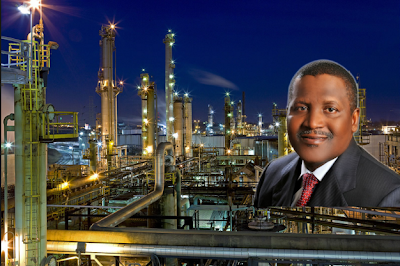Dangote Refinery, with capacity of processing 650,000 barrels of crude per day, will receive its first cargo of crude next month, according to reports.
Report said the refinery will begin producing up to 370,000 barrels per day of diesel and jet fuel from October, S&P Global Platts, which provides benchmark prices for commodity markets around the world, reported Tuesday, quoting an official of the company.
Nigerian former President, Muhammadu Buhari commissioned the refinery in May amid high expectations that it will impact the nation’s oil and gas sector and the larger economy.
The pipeline infrastructure at the refinery is said to be the largest in the world, with 1,100 kilometres and will handle three billion standard cubic feet of gas per day.
Aliko Dangote, the President of Dangote Group, promised during the official commissioning of the refinery that the first refined petroleum products from the refinery would hit the market before the end of July. But this has not come to pass.
However, in an exclusive interview with S&P Global Platts, the Executive Director of the Dangote Group, Devakumar Edwin, said the refinery will be launched in phases, beginning with 350,000 – 370,000 barrels per day of diesel and jet fuel by October.
“Right now I’m ready to receive crude. We are just waiting for the first vessel. And so as soon as it comes in we can start,” Mr Edwin was quoted by S&P Global Platts as saying.
According to him, the refinery will launch in phases, beginning with 350,000 – 370,000 barrels per day of diesel and jet fuel by October, when the crude distillation unit, sulfur block and hydrogen plant should be online.
Mr Edwin said, the refinery will start the phased ramp-up to 650,000 barrels per day, around half of it gasoline, the key area of Nigerian fuel demand.
He noted that the Nigerian National Petroleum Company (NNPCL), which is a shareholder in the project, cannot supply the refinery until November.
So, he said Dangote is buying oil from trading houses. Vitol and Trafigura recently carried out inspections of the plant.
“At the last minute (NNPC) said, ‘We have actually committed our crude on forward basis to someone else’, so immediately they don’t have the crude. This is a temporary issue, and the refinery should run on exclusively Nigerian crude by November,” he said.
He said Nigerian oil will be purchased in US dollars, not naira as some reports had suggested, because it is located in a free zone on the outskirts of Lagos.
However, he said NNPC will supply some crude at knockdown prices due to its equity stake.
Mr Edwin added that the scale of the refinery being “solely dependent on Nigerian crude would not be advisable.”
He said the refinery can process most African crudes apart from heavy Angolan grades as well as Middle Eastern Arab Light and even US light tight oil.
“We can even take some of the Russian grades if the global system opens up to allow us to receive (them),” he said.
He explained that the company’s refined products are not only targeting the Nigerian market.
“Basically if you look at our production profile, 50 per cent of my production will meet 100 per cent of the requirements of the country. Excess gasoline which will be 10 ppm sulfur Euro 5 quality will be exported to other African markets as well as the US and South America, although the volumes will be relatively small,” he said.
Meanwhile, he said jet fuel will be exported to Europe and diesel will be sold in sub-Saharan Africa.
He said refined products can be evacuated from the refinery by road or by sea, with the two routes able to handle 80 per cent and 75 per cent of production respectively.
“The company is also widening the road connecting the refinery to the expressway. That job is 70 per cent complete,” he added.




























